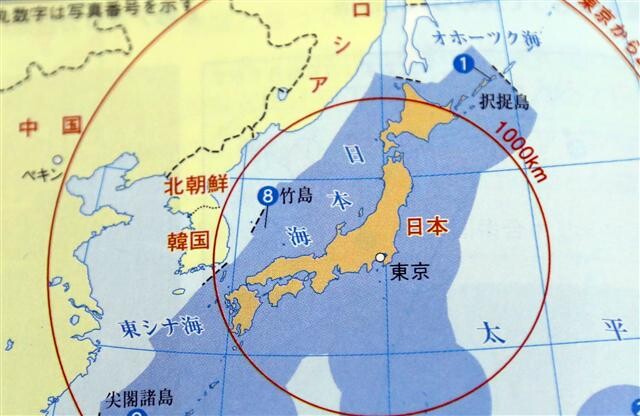hankyoreh
Links to other country sites 다른 나라 사이트 링크
Japanese textbooks to include claims of sovereignty over Dokdo

Japanese high school students next year will be studying from textbooks teaching that Dokdo is Japanese territory that is being illegally occupied by South Korea.
This year’s high school authorization marks the culmination of the Shinzo Abe administration’s march toward right-leaning textbooks, followed the approval of elementary and middle school textbooks containing the same content in 2014 and 2015, respectively.
At a meeting of its Textbook Authorization and Research Council on Mar. 18, the Japanese Ministry of Education, Culture, Sports, Science and Technology affirmed and announced the authorization results for textbooks that are to be used by first and second year high school students as of next year.
References to Dokdo appeared in 27 of the 35 textbooks in history, society, geography, and other social studies subjects that requested authorization this time, or 77.1%. Not all of them describe Dokdo as Japanese territory, but with students learning between different textbooks in difficult subjects areas like history, social studies, and geography, most if not all with study from at least one textbook that does. In contrast, similar references appeared in 21 out of 39 textbooks that passed authorization in 2012 - just over half, or 53.8%.
The reason for the new inclusion of textbook references to Dokdo is an amendment to the manual on educational curricullum guidelines made in Jan. 2014 after Abe took office as Prime Minister. The new version stated that textbooks should “help students understand that there remain unresolved issues concerning the Northern Territories [the four southern Kuril Islands] and Takeshima [the Japanese word for Dokdo], which are Japanese territory.” Previously, Tokyo demanded only that textbooks include references to the Northern Territories, which are the subject of a dispute with Russia; after then-South Korean President Lee Myung-bak (2008-2013) visited Dokdo in Aug. 2012, it changed its policies to also include references to Dokdo.
While references to issues such as forced mobilization of Koreans as labourers and so-called “comfort women” drafted to serve as sexual slaves to the Japanese military were not deleted outright, their treatment in most textbooks remained inadequate. Four years earlier, textbooks used phrasing that clearly stated the forcible nature of the comfort women system, with a Tokyo Shoseki textbook stating that women had been “taken away to serve as comfort women” and a Yamagawa Publishing textbook referring to “women forced to work in comfort women facilities.” In contrast, textbooks this year adopted phrasing that was more ambiguous on Japanese government responsibility and the system’s forcible nature. For example, the Tokyo Shoseki textbook notes that “some women were sent to the front lines as comfort women.” More specific references to the comfort women did survive in some books by more progressive-leaning publishers such as Jikkyo.
The South Korean government expressed dismay at the move in a statement by Ministry of Foreign Affairs spokesperson Cho June-hyuk.
“We strongly lament the authorization of more high school textbooks that express distorted historical views with unjust claims about Dokdo, which is South Korean territory, and we demand immediate action to rectify this,” the statement said.
But Seoul did not respond to the textbooks’ accounts concerning the comfort women issue. Its criticisms on historical issues were also somewhat indirect, with references to “expressing distorted historical views” and “neighboring countries that suffered as a result of a history of aggressions.”
Ministry of Foreign Affairs East Asia bureau chief Jeong Byeong-won summoned Hideo Suzuki, deputy chief of mission at the Japanese Embassy in Seoul, to the ministry in Seoul on the afternoon of Mar. 18 to lodge a protest.
By Kim Jin-cheol, staff reporter
Please direct questions or comments to [english@hani.co.kr]

Editorial・opinion
![[Column] Has Korea, too, crossed the Rubicon on China? [Column] Has Korea, too, crossed the Rubicon on China?](https://flexible.img.hani.co.kr/flexible/normal/500/300/imgdb/original/2024/0419/9317135153409185.jpg) [Column] Has Korea, too, crossed the Rubicon on China?
[Column] Has Korea, too, crossed the Rubicon on China?![[Correspondent’s column] In Japan’s alliance with US, echoes of its past alliances with UK [Correspondent’s column] In Japan’s alliance with US, echoes of its past alliances with UK](https://flexible.img.hani.co.kr/flexible/normal/500/300/imgdb/original/2024/0419/2317135166563519.jpg) [Correspondent’s column] In Japan’s alliance with US, echoes of its past alliances with UK
[Correspondent’s column] In Japan’s alliance with US, echoes of its past alliances with UK- [Editorial] Does Yoon think the Korean public is wrong?
- [Editorial] As it bolsters its alliance with US, Japan must be accountable for past
- [Guest essay] Amending the Constitution is Yoon’s key to leaving office in public’s good graces
- [Editorial] 10 years on, lessons of Sewol tragedy must never be forgotten
- [Column] A death blow to Korea’s prosecutor politics
- [Correspondent’s column] The US and the end of Japanese pacifism
- [Guest essay] How Korea turned its trainee doctors into monsters
- [Guest essay] As someone who helped forge Seoul-Moscow ties, their status today troubles me
Most viewed articles
- 1[Column] The clock is ticking for Korea’s first lady
- 2After 2 months of delayed, denied medical care, Koreans worry worst may be yet to come
- 3[Column] Has Korea, too, crossed the Rubicon on China?
- 4US overtakes China as Korea’s top export market, prompting trade sanction jitters
- 5[Editorial] When the choice is kids or career, Korea will never overcome birth rate woes
- 6[Correspondent’s column] In Japan’s alliance with US, echoes of its past alliances with UK
- 7[Photo] Smile ambassador, you’re on camera
- 8Hong Se-hwa, voice for tolerance whose memoir of exile touched a chord, dies at 76
- 9Nearly 1 in 5 N. Korean defectors say they regret coming to S. Korea
- 10Strong dollar isn’t all that’s pushing won exchange rate into to 1,400 range